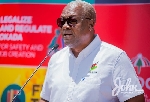COVID-19: $25m for National Vaccine Institute – Akufo-Addo
 President Nana Akufo-Addo
President Nana Akufo-Addo
President Nana Akufo-Addo has announced that his government is committing some $25 million to the establishment of a National Vaccine Institute, as part of measures to shore up the country’s preparedness for vaccine production in cases such as the current festering COVID-19 pandemic.
In his 26th address to the nation on the virus on Sunday, 25 July 2021, Mr Akufo-Addo said the government stands by its commitment to vaccinate twenty million Ghanaians, i.e., the entire adult population, by the end of this year, in spite of the huge global demand for vaccines by countries, and the surge in infections the world over.
So far, he noted, “one million, two hundred and seventy-one thousand, three hundred and ninety-three (1,271,393) vaccine doses have been administered, with eight hundred and sixty-five thousand, four hundred and twenty-two (865,422) persons having received a single jab, and four hundred and five thousand, nine hundred and seventy-one (405,971) persons have received their full dose of two (2) jabs”.
He said indications are that in the course of the third quarter of this year, “the availability of vaccines for our country will ramp up”, disclosing: “We are expecting, through the COVAX facility, one million Pfizer vaccines from the United States of America, two hundred and twenty-nine thousand, six hundred and seventy (229,670) Pfizer vaccines from the African Union, and two hundred and forty-nine thousand (249,000) AstraZeneca vaccines from the United Kingdom”.
The government, he noted, “is also in the process of procuring seventeen million (17 million) single dose per person Johnson & Johnson vaccines, through the African Medicine Supply Platform, in this quarter”.
“We have, as such, upgraded our national, regional and district cold chain facilities in order to widen our access to vaccines like Pfizer and Modena, that require minus seventy degrees Celsius (-70℃) cold chains. These include sixteen (16) ultra-low cold freezers, fifty-eight (58) units of ultra-low freezers, fifty (50) normal vaccine refrigerators, three hundred (300) boxes to be filled with ice packs, three hundred (300) ice packed freezers, ten (10) cold chain vans, and one hundred and twenty (120) temperature monitoring devices. I thank, in particular, UPS, the American multi-national shipping, receiving and supply chain management company, for their generous donation towards this development”.
“It is important to stress, once again, that all the vaccines to be used in the country have been certified as safe-for-use by our national regulatory agency, the Food and Drugs Authority (FDA). There should, therefore, be no hesitancy amongst the population who are yet to be vaccinated. As the oft-cited saying goes, it is better to be safe than sorry”, Mr Akufo-Addo said.
The global shortage of vaccines, he noted, “means that we must develop our capacity to produce our own vaccines domestically, and reduce our dependence on foreign supplies. We must be self-sufficient in this regard in the future, and prepare ourselves better to deal with any such occurrences in the future”.
To this end, he announced, “the Committee I established, under the leadership of the world-renowned Ghanaian scientist, Professor Kwabena Frimpong Boateng, to investigate Ghana’s potential as a vaccine manufacturing hub, to meet national and regional needs, has presented its preliminary report which, amongst others, recommends the establishment of a National Vaccine Institute to spearhead this development”.
The government, the president noted, “has committed to inject seed funding of some twenty-five million United States dollars (US$25 million) this year into this whole enterprise”.
The Institute will be charged with delivering six clear mandates:
establishing local vaccine manufacturing plants;
deepening Research & Development (R&D) for vaccines in Ghana;
upgrading and strengthening the FDA;
forging bilateral and multilateral partnerships for vaccine manufacturing in various areas, such as funding, clinical trials, technology transfer, licensing, and assignment of intellectual property rights;
building the human resource base for vaccine discovery, development, and manufacture; and
establishing a permanent national secretariat to coordinate vaccine development and manufacture.
Meanwhile, the has urged workplaces and their owners to run shifts as part of measures to stem the tide of the COVID-19 upsurge.
“With workplaces currently witnessing a resurgence in COVID-19 infections, I want to admonish businesses, workplaces and their owners and management to observe staff management and workplace protocols, such as the use of a shift system and technology, with the view to achieving social distancing and hygiene protocols”.
The Ghana Health Service, he noted, “has moved to fortify its contact tracing, testing and treating campaigns, especially across the hotspots of Greater Accra and Greater Kumasi Metropolitan areas. COVID-19 treatment centres continue to be resourced with medical supplies, personal protection equipment, and health workers”.
The president also said: “We will continue to ensure that all arriving passengers at the Kotoka International Airport are in possession of a negative PCR test result upon their arrival in Ghana, a test which should have been conducted not more than seventy-two (72) hours before the scheduled departure from the country of origin. In addition, all passengers will continue to be subjected to a mandatory COVID test on arrival”.
The president said the upsurge in cases clearly shows that Ghana is experiencing a third wave, which he put down to the relaxing of adherence to the safety protocols.
“As per data available from the Ghana Health Service, it appears that, unfortunately, our nation is experiencing a third wave of COVID-19 infections”, the president noted.
“These increased infections have largely been driven by the Delta Variant of the virus, which, according to the World Health Organisation, has increased transmissibility rates, and, in our case in Ghana, has led, in recent weeks, to a rise in hospitalisation and ICU bed uptakes, and, tragically, deaths”, he noted.
Indeed, he said, in Update No.25, “the last update I rendered, our total active case count stood at one thousand, three hundred and fourteen (1,314), with our daily infection rate standing at one hundred (100). One million, one hundred and twenty-one thousand, one hundred and sixty-eight (1,121,168) COVID tests had been conducted, out of which ninety-two thousand, four hundred and sixty (92,460) persons had been infected, ninety-one thousand, one hundred and forty-six (91,146) persons had recovered, with a total of seven hundred and eighty-three (783) deaths”.
As of Wednesday, 21st July 2021, however, “ten (10) weeks later, the Ghana Health Services is now reporting that our total number of active cases stands at four thousand and ninety-four (4,094). A total of one million, three hundred and ninety-four thousand, five hundred and forty (1,394,540) tests have been conducted, out of which one hundred and one thousand, one hundred and seventy (101,170) persons have been infected with the virus, and ninety-six thousand, two hundred and fifty-five (96,255) persons have recovered”.
“Sadly”, he bemoaned, close to 40 more people have died from COVID over the last 10 weeks, with Greater Accra and Greater Kumasi Metropolitan areas remaining the hotspots of infections. “This entire development is very alarming, especially as we are being told by officials of the Ghana Health Service, that the recovery rate is on the decline”.
“Fellow Ghanaians, it is obvious from the data that we have let our guard down, with many going about their daily duties in clear breach and disregard for the protocols”.
“At a time when the economy is on the rebound, and business activities picking up, we must do everything possible to contain this outbreak”, he urged, adding: “We cannot afford to return to the days of partial lockdowns, which brought considerable hardships and difficulties for all of us”.
The president announced a ban on all post-funeral receptions and said one-week funeral anniversaries should be “restricted solely to family members, and should not exceed a duration of two hours”.
He also directed that all funerals should not go beyond two hours.
The 26th COVID-19 address comes 24 hours after the Noguchi Memorial Institute for Medical Research (NMIMR) warned that fully-vaccinated persons are testing positive for the fast-spreading Delta variant with very high viral loads.
NMIMR observed, “with concern”, some characteristics of the new Delta variant of SARS-Cov-2 detected at the institute’s testing centre since April 2021.
In a statement issued on Saturday, 24 July 2021, the Institute said the “positive cases have very high viral loads indicated by low cut-off thresholds (CT values) obtained in the real-time RT-PCR assay”.
The CT values for the majority are between 15 and 20 compared to higher values above 30, seen previously, NMIMR noted.
The Institute also said it has observed that “the positive individuals are taking longer to clear the virus”, explaining: “This is evident in the number of retests that still test positive”.
NMIMR also revealed that its recent sequencing of SARS-Cov-2 has revealed an “increased circulation of the Delta variant in Ghanaian communities compared to the earlier Alpha variants”.
“The higher viral loads observed in recent cases are attributable to the Delta variant”, the statement said.
Transmission of SARS-Cov-2 is directly linked to how much virus is shed in droplets during sneezing and coughing, which also determines the spread through talking, singing and other related activities.
The Delta variant has been reported to spread faster than the other variants and our testing observations confirm that.
The statement said some clinical specimen submitted to the Institute have tested positive with high viral loads.
“Also, 7.34 per cent (840/6,538) of the positive cases recorded from asymptomatic persons who visit the walk-in centre to test for travel, work- or school-related purposes from 1 June to 22 July 2021, have equally high viral load”, NMIMR noted.
Noguchi warned: “With a population of more than 80 per cent unvaccinated, the country must be concerned that if these, apparently healthy carriers, transmit the virus to the unvaccinated, we may have a more serious outbreak to deal with as a nation”.
Some of these positive cases, it noted, “have taken the full dose of COVID-19 vaccines”.
“It is, therefore, recommended that the government take a second look at the state of adherence to COVID-19 preventive protocols and appropriate restrictions”.
Currently, the number of active COVID-19 cases in Ghana has shot up to 4,094, the latest figures from the Ghana Health Service indicate.
Some 423 new cases have been confirmed.
The death toll has also risen to 821.
Since March 12, 2020, the total number of COVID-19 cases recorded in Ghana up to date is 101,170.
Out of that number 96,255 have recovered.
A few days ago, President Nana Akufo-Addo said the rising number of active COVID-19 cases shows that “we’ve let our guard down”.
Addressing Muslims at the Eid-ul-Adha celebration at the National Central Mosque at Kanda, Accra, President Akufo-Addo said: “The COVID-19 pandemic is still with us – unfortunately”.
“This means that for the second year running, we are having to hold a subdued Eid celebration”, he observed.
“As we continue to count on the grace of God to protect our country from the ravages of the pandemic like he has since its outbreak, we can only minimise its health effects and avoid a full-blown third wave if we continue to be responsible and observe the safety and hygiene protocols.”
He noted: “The recent increase in the number of infections is a source of worry for me and, indeed, for all Ghanaians”.
“From the rising numbers, it is safe to conclude that we have let our guard down and are beginning to live our lives and conduct our businesses as though we are in normal times”.
“It is important to repeat that the virus is still with us and until each one of us receives a dose of the vaccine, the protocols must continue to be a part and parcel of our daily activities,” he added.
Source: classfmonline.com
Trending News

Clear indication defeat staring NPP in the face - NDC
10:58
NPP sets up disability secretariat
02:46
Osafo-Maafo’s dumsor timetable comment attempt to scuttle Napo's running mate bid - Mornah
09:11
Bawumia jets to Italy for bilateral discussions with Pope
13:14
Train crash: I'd be asking some serious questions were I president – Mahama
07:02
Asantehene commends Matthew Opoku Prempeh for conceiving GENSER Kumasi Pipeline Project
01:37
Tema West: Akufo-Addo nominates Felicia Attipoe as MCE
08:55
Dumsor must stop demo part 2: We’ll choose how we demonstrate and who to partner – Franklin Cudjoe replies Yvonne Nelson
10:17
Struggle for next NDC leader'll make Mahama gov't lose focus if he wins 2024 polls - Afenyo-Markin says Bawumia 'better' option
14:16
Adu Boahen’s murder: Police arrest house help who was in possession of deceased’s personal belongings
08:54



